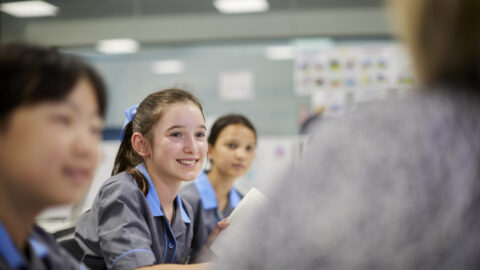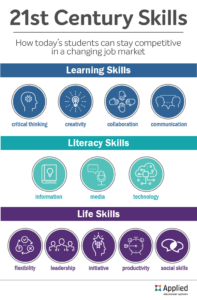Barbreck News – Capable Leaders, Full of Promise

Complex Reasoning Skills in Action
Last week, a selection of girls in Years 5 and 6 participated in the Australasian Problem-Solving Maths Olympiad. While the competition had minds racing, it was the after-competition reflective discussion I overheard that had me most interested.
Participants of the Olympiad were discussing how they had answered the questions with an animated conversation. The girls were justifying their answers, explaining how they analysed the problem, justifying why they chose the strategies they did, debating which strategy was the most effective, and highlighting aspects of the problems that had been missed by some.
There was a real sense of collaboration between the girls – they were eager to learn how others saw the problem, broke it down, and applied their chosen strategy. They were seeing the discussion as a learning opportunity – one they initiated and undertook without teacher guidance.
This discussion represented years of learning, a growing positive mindset, and a willingness to learn from their fellow classmates.
As an educational leader, my goal is for every Barbreck girl to develop 21st Century skills and apply them in their everyday life. Witnessing this discussion amongst the girls was so rewarding. It was evidence of the goal we are striving for and an example of best practice learning and thinking.
 Within the Australian Curriculum, General Capabilities are developed to equip students with the skills necessary to live and work successfully in the 21st Century. These skills include critical thinking, creativity, collaboration, and communication. Within the reflective student conversation detailed above, the girls demonstrated:
Within the Australian Curriculum, General Capabilities are developed to equip students with the skills necessary to live and work successfully in the 21st Century. These skills include critical thinking, creativity, collaboration, and communication. Within the reflective student conversation detailed above, the girls demonstrated:
- Critical Thinking when selecting the mathematical strategies
- Creativity in applying the selected mathematical strategy
- Collaboration when working with others to demonstrate how they solved the problems
- Communication when explaining their analysis and interpretation, as well as how they went about solving it.
The girls see themselves as capable learners who have ownership of their learning. They realise they can actively help themselves to become better learners and see and take advantage of opportunities to improve their learning when they can, including learning from others.
While the conversation lasted only minutes, for me it was full of promise and excitement that our academic programs and the work of our Barbreck teachers are making an impact.
Girls and Friendships
It has been wonderful to observe the girls reconnecting with friends this term, following on from the interruptions of lockdowns over the past two years. Opportunities to learn and play together again have been a high priority within our return to School in 2022. The girls have all reconnected with friends, along with developing new friendships, well.
Throughout the normal course of child and adolescent development, friendship issues can sometimes arise. Whilst these friendship ‘speed bumps’ are common, it is important for girls to gain an appreciation for what real friendships are, rather than what may be shown via social media or television.
The first of these is the need for a BBF (Best Friend Forever). Sherri Gordon, a published author and bullying prevention expert comments, “[the BFF] idea has morphed into a fantasy… one where they (the friends) never fight, are super close, and they are always happy.”
The problem is this is not reality – BFFs rarely happen. The need for a BFF and the reality of a friendship can often leave girls confused about what a friendship is, and how they work.
Friendships that occur in the early years are often those of convenience – they both like the same games, they might live near each other, they might go to the same places, their mothers might be friends etc.
However, as each individual grows and develops, they will start to realise that they do not share all of the same likes. They might want to do different things, play different games, play with other groups. As they grow, they will each develop particular likes, dislikes, interests, and wants.
These differing wants, likes, and interests can sometimes lead to conflict when one or both parties feel their needs are not being met by the friendship. They need to learn that change happens and is a natural part of life – it is not a negative reflection on them or their friend.
Dr Angharad Rudkin, clinical psychologist, shares, “conflict is a normal part of friendship, but for children who are experiencing it for the first time, it can feel catastrophic.”
Friendships change often, and we find in the primary years it occurs most commonly when either friend grows apart as their interests change and they like different things, or when one girl wants more friends, and the other does not want to share the friend they have.
It is important as educators and parents to help girls navigate these difficult times. Dr Rudkin provides tips for girls navigating through friendships:
- Change happens. It is a natural part of life. Friendships come and go, people grow apart and new opportunities come along. It is not always enjoyable or easy.
- Use the opportunity to make new friends. Are there other people you like but have never really had time to hang out with? Is there a sports team or interest you haven’t got around to trying?
- Think about the people you like. Do you like them because they are friendly, make you laugh or listen to you when you talk to them? Think about what you want in a friend.
- Know that unhappy times will pass. You will have good times and feel happy soon.
Within Barbreck, our teachers encourage girls to have a wide circle of friends. The concept of friendships is also taught in Health and Wellbeing lessons, where concepts of what to look for in a friend, how to be a good friend, and how to negotiate or compromise often help sustain friendships.
Our co-curricular programs, activities, and clubs also provide wonderful opportunities for our girls to make connections with girls who have similar interests and across the Year levels. Our Junior School Psychologist, Ms Lena Wintermantel, also supports girls experiencing friendship concerns.
End of Term Events
Easter is fast approaching and over the course of Week 10, we have a number of activities to end the term as we started – full of excitement and joy at being at Barbreck!
31 March – Junior School Music Recital 3.40pm
6 April – Easter Bonnet Parade 2.00 till 3.00pm
7 April – Easter Service 2.00 till 3.00pm (St John’s Anglican Church, Toorak)
Out of School Hours Care – Term 1 Week 10 Activities
 Upcoming activities for Term 1 Week 10 detailed here.
Upcoming activities for Term 1 Week 10 detailed here.
St Catherine’s School offers an Out of School Hours Care program to all ELC and Junior School families. The program is implemented by our provider ‘After the Bell’, and operates within the ELC building. Parents are reminded that if you need to use the Before School Care or After School Care service, registrations need to be made in advance with ‘After the Bell’. Please allow up to five business days for your registration to be processed before your child can begin attending the program. Registration is free. All families are encouraged to register so that you can use this service in the event that you are unable to pick up your child.
Before School Care – 7.00am to 8.45am
After School Care – 3.00pm to 6.00pm
Registrations can be completed via the ‘After the Bell’ website.
Please phone 9758 6744 for all enquiries.


